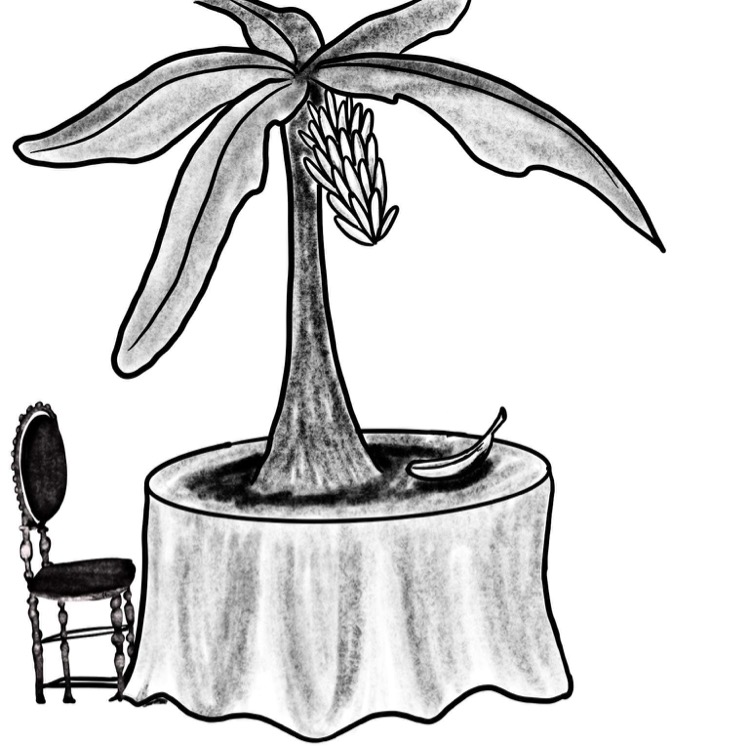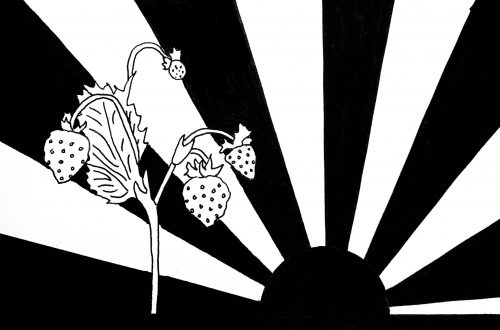by Kristi Eaton
Kristi’s essay appears in episode 31 of The Dirty Spoon Radio Hour.
In St. Lucia, one resort has a living history museum to bananas, in an effort to grow all the banana varieties in the Caribbean. In Kenya, guests staying at a luxury safari lodge can pick their own ingredients from the local farm for their own salads, adding fresh flavor to an already indulgent experience.
It’s the latest – and ultimate – garden-to-fork experience: hotels and resorts growing their own produce, herbs and other items on the grounds for use in their restaurants and dishes prepared for guests.
The East Winds resort in St. Lucia is attempting to preserve banana varieties that are becoming increasingly rare. The reason? Some varieties of bananas are difficult to grow or difficult to transport and so they only have a small local market. Bananas ranging in colour from yellow to red and green can now be enjoyed by guests at the resort’s Flamboyant restaurant. There are even some varieties that can be used as an alternative to potato and the resort produces simple snack chips from them.
“We’re growing the bananas using traditional methods and, ultimately, we want to open up the museum as a resource for local schools, so they can enthuse school children about banana growing and have a new enthusiastic generation ready to take over from the older farmers,” said Judith Milne, managing director of East Winds.
At the Angama Mara, the award-winning luxury safari lodge overlooking the iconic Maasai Mara in Kenya, The Shamba (Swahili for vegetable garden) opened in 2018. The Shamba is built with environmentally friendly construction methods and is divided into five zones for different produce. Under romantic towering shade trees, the lodge offers private Shamba-to-table lunches in the garden. Guests can pick their own ingredients, which are then washed and readied for a possible salad.
Guests can pick their own ingredients, which are then washed and readied for a possible salad.
Meanwhile, in Tibet, Songtsam Hotels Resorts & Tours has organic farms on their resort properties in Benzilan, Bome, Cizhong, and Tacheng. These farms grow seasonal tomatoes, peppers, cabbage, and fruits, which allows Songtsam to offer fresh farm-to-table meals, including vegetarian and organic dishes.
Chef Wangdui, from Shangri La, has curated interactive cooking experiences for Songtsam’s guests. “We have cooking classes with local chefs where guests can make traditional Tibetan dishes like butter tea and yak cheese dishes,” he said. Local chefs can also accompany guests to the nearby market and organic farm, where guests pick fresh produce for that day’s meal. Tibet’s high altitude has shaped not only a lifestyle and culture but also the food and drink of the region. The four basic staples of the Tibetan diet are the famous tsampa (roasted barley flour), butter tea, high-protein meats, and noodles: foods that are organic and locally sourced.
Tibet’s high altitude has shaped not only a lifestyle and culture but also the food and drink of the region.
Back in the Caribbean, also in St Lucia, sister resorts Jade Mountain & Anse Chastanet share a lush, 600-acre property that’s home to the Emerald Estate regenerative farm, which grows and harvests a large variety of produce while being careful not to compete with local farmers. Vanilla, cacao, honey, mango, and asparagus are just a few of the fresh ingredients grown onsite and used in the resorts’ restaurants and culinary programs.
They recently debuted an herbal medicine garden that pays homage to the island’s Indigenous roots and wellness traditions. Guests can tour the garden with the resorts’ Horticulture Manager, who guides them through an educational lesson on the significance of each herb and plant and their various health benefits. The garden features a living teepee made of Moringa trees. Moringa is one of the world’s greatest superfoods and a source of chlorophyll and iron. Additional herbs in their medicine garden include ginger, turmeric, basil, Panadol plant, shado beni, fennel and more.
Guests can tour the garden with the resorts’ Horticulture Manager, who guides them through an educational lesson on the significance of each herb and plant and their various health benefits. The garden features a living teepee made of Moringa trees.
At Kimpton Angler’s Hotel South Beach in Miami, Executive Chef Craig Tooker is putting the finishing touches on its new Breezeway Herb Garden, set to be completed by the end of September.
According to Chef Tooker, “The herbs will be part of the kitchen’s everyday menus and specialty menus, with the variety of herbs planted allowing us to incorporate them into all of the menus and dishes we create.”
“The herbs will be part of the kitchen’s everyday menus and specialty menus, with the variety of herbs planted allowing us to incorporate them into all of the menus and dishes we create.”
Curated with the help of local horticultural experts and driven by Tooker’s focus on incorporating fresh, local, seasonal, and sustainable ingredients, the garden will feature such herbs and greens as lemongrass, thyme, mint, basil, opal basil, oregano, tarragon, dill, cilantro, flat leaf parsley, chives, serrano peppers, habanero peppers and a key lime tree.
Kimpton Angler’s Breezeway Herb Garden will be overseen by Chef Tooker with the help of a local landscaper to ensure the proper growth of herbs that will be featured in dishes planned for the hotel’s new Seawell Fish n’ Oyster restaurant and Minnow Bar menus set to roll-out over the coming weeks.
The hotel is also looking to make the garden an interactive experience for guests, including signage in place throughout for them to learn about each of the herbs grown and how they are used. Guests will be able to stroll the garden and pick their own herbs whether for a cocktail or chosen dish.
This signals a new chapter in hotel stays, and a shift in values for guests.
The old idea of “elevating” a dish is being brought back down to earth, into the very dirt itself, and may mark the beginning of resort rooftop gardens and on-site farms for many more properties to come.
Original artwork by Alex Knighten
About the Author
Kristi Eaton is a freelance journalist and communications professional who writes about social justice issues, travel, gender and more. Her work has appeared in the New York Times, the Washington Post, the Associated Press, Reuters and elsewhere. Follow her on Twitter or Instagram @KristiEaton or visit her website.






